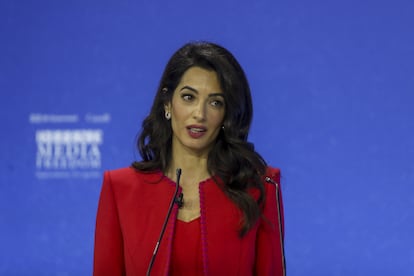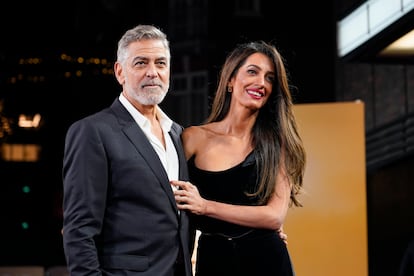Amal Clooney, a key figure in the request for Netanyahu’s arrest by the International Criminal Court
The lawyer has spent more than 20 years defending high-level causes and has now served on a panel of legal experts to evaluate evidence of suspected war crimes and crimes against humanity in Israel and Gaza


On Monday, the International Criminal Court (ICC) in The Hague announced that it will seek arrest warrants for Israeli Prime Minister Benjamin Netanyahu and his Defense Minister, Yoav Gallant. In addition, the court has also called for the arrest of three key Hamas leaders. The ICC accuses them all of war crimes and crimes against humanity. The order comes from the chief prosecutor, 53-year-old British lawyer Karim Khan, but he has not made the decision alone. He has had a series of high-level criminal lawyers who have advised him with extensive reports prepared over the course of several months. And one of those key lawyers has been Amal Clooney.
The 46-year-old Briton was known in her work circle for years for her high-level lawsuits, although at that time she was known by her maiden name, Alamuddin. She stepped into the international limelight when she began a relationship with the well-known actor George Clooney in 2013, and her own celebrity status increased after their wedding, held in Venice with great fanfare in September 2014. The couple have twins, Ella and Alexander, who are almost seven years old.
Both Amal and George Clooney have always been positioned on the side of the Democrats — with frequent and harsh criticism against former President Donald Trump — and have been involved in different political and humanitarian causes. But not many people knew that the lawyer reached such levels of influence.
For months now there are those who had been wondering where the couple was, and why it had not spoken out about the war between Israel and Hamas that started on October 6 — especially Amal, because of her profession and the fact that she is Lebanese by birth, although she was raised in the United Kingdom (she studied law at Oxford). The couple has a foundation, the Clooney Foundation for Justice (CFJ), and has shown commitment to the victims of the war in Ukraine, but has remained silent regarding the Middle East conflict. It is only now that it has emerged that during all these months the jurist was focusing on an expert report for the ICC.
In the statement that accompanies the report, released by her foundation, the lawyer explains that “more than four months ago, the Prosecutor of the International Criminal Court asked me to assist him with evaluating evidence of suspected war crimes and crimes against humanity in Israel and Gaza. I agreed and joined a panel of international legal experts to undertake this task. Together we have engaged in an extensive process of evidence review and legal analysis including at the International Criminal Court in The Hague.”

Despite our diverse personal backgrounds, our legal findings are unanimous. We have unanimously determined that the Court has jurisdiction over crimes committed in Palestine and by Palestinian nationals. We unanimously conclude that there are reasonable grounds to believe that Hamas leaders Yahya Sinwar, Mohammed Deif and Ismail Haniyeh have committed war crimes and crimes against humanity, including hostage-taking, murder and crimes of sexual violence. We unanimously conclude that there are reasonable grounds to believe that Israeli Prime Minister Benjamin Netanyahu and Israeli Defense Minister Yoav Gallant have committed war crimes and crimes against humanity including starvation as a method of warfare, murder, persecution and extermination,” reads the statement.
The lawyer explains that she made the decision to serve on this panel because she firmly believes in the law and in “the need to protect civilian lives.” She notes that “the law that protects civilians in war was developed more than 100 years ago and it applies in every country in the world regardless of the reasons for a conflict.”
“As a human rights lawyer, I will never accept that one child’s life has less value than another’s. I do not accept that any conflict should be beyond the reach of the law, nor that any perpetrator should be above the law. So I support the historic step that the Prosecutor of the International Criminal Court has taken to bring justice to victims of atrocities in Israel and Palestine.”
She also says that “my approach is not to provide a running commentary of my work but to let the work speak for itself. I hope that witnesses will cooperate with the ongoing investigation. And I hope that justice will prevail in a region that has already suffered too much.
For more than 20 years, Clooney has been involved in a number of diverse causes. She works at a prestigious London law firm specializing in human rights called Doughty Street Chambers and is also an adjunct professor at Columbia Law School in New York. She has been collaborating with Prosecutor Khan for three years, when he asked her to act as special advisor to observe the humanitarian crisis in the Darfur region. In addition to creating the foundation that bears their names in 2016, the couple have made numerous donations through it, such as the $1 million they gave in 2017 to fight against racism and hate crimes in the United States, the aid project to provide schooling to 3,000 Syrian refugee children in Lebanon, arms control or hosting an Iraqi refugee fleeing the Islamic State in their own home. The lawyer has also worked on international cases, such as the long border dispute between Vietnam and Cambodia, on the return of Greek sculptures from the British Museum to Greece; and on the recognition of the Armenian genocide.
Sign up for our weekly newsletter to get more English-language news coverage from EL PAÍS USA Edition
Tu suscripción se está usando en otro dispositivo
¿Quieres añadir otro usuario a tu suscripción?
Si continúas leyendo en este dispositivo, no se podrá leer en el otro.
FlechaTu suscripción se está usando en otro dispositivo y solo puedes acceder a EL PAÍS desde un dispositivo a la vez.
Si quieres compartir tu cuenta, cambia tu suscripción a la modalidad Premium, así podrás añadir otro usuario. Cada uno accederá con su propia cuenta de email, lo que os permitirá personalizar vuestra experiencia en EL PAÍS.
¿Tienes una suscripción de empresa? Accede aquí para contratar más cuentas.
En el caso de no saber quién está usando tu cuenta, te recomendamos cambiar tu contraseña aquí.
Si decides continuar compartiendo tu cuenta, este mensaje se mostrará en tu dispositivo y en el de la otra persona que está usando tu cuenta de forma indefinida, afectando a tu experiencia de lectura. Puedes consultar aquí los términos y condiciones de la suscripción digital.








































